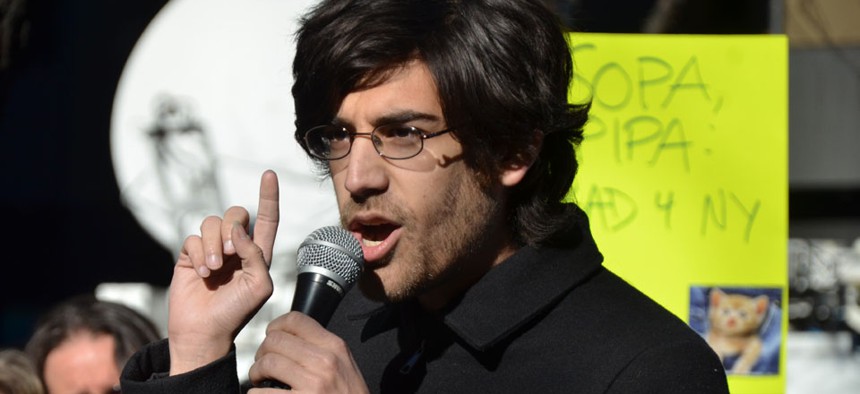MIT Delays the Release of Aaron Swartz's Secret Service File

Aaron Swartz spoke at a SOPA protest in 2012. Flickr user selfagency
File could expose the identities of employees who assisted in the prosecution of the activist, university argues.
A couple of weeks ago, it looked like the federal government would (finally) start releasing what amounts to thousands of pages of documents pertaining to the Secret Service's investigation into Aaron Swartz. But on Thursday, MIT stepped in with a motion to delay the release of those documents. Swartz, the internet and open information activist who died earlier this year, was the subject of a federal case after he downloaded in bulk from the JSTOR academic database, using a computer set up in a utility closet on MIT's campus. The university seems to think that the pending FOIA request for the file could expose the identities of employees who assisted in the prosecution of the activist.
The FOIA request for Swartz's file comes from Wired reporter Kevin Poulsen, who ended up suing for access after his public information request was denied by the Homeland Security Department (that's the parent organization of the Secret Service). And then, in July, a judge ordered the department to "promptly" begin the release of documents that promise to give the public a lot more information on the investigation leading to the federal case against the activist. That release was supposed to begin tomorrow. Now, the process is delayed once more.
Here's the gist of MIT's rationale for the delay, which argues that MIT's right to protect their employees outweighs Poulsen's right to public information:
MIT has reason to believe that documents that may imminently be released by the Department of Homeland Security ("DHS") to Mr. Poulsen in the present case contain similar information that, if released without appropriate redactions, could jeopardize the safety of MIT community members and make its network more vulnerable to cyberattacks. MIT therefore moves to intervene as a Defendant and asks this Court to establish a process that affords MIT the opportunity to conduct an expeditious pre-release review of any documents that contain information that MIT submitted to DHS or that describes MIT's employees or networks. This will permit MIT to propose appropriate redactions to DHS before the documents are released to Mr. Poulsen and placed irretrievably into the public domain.
NEXT STORY: Your essential catch-up on the week's news





